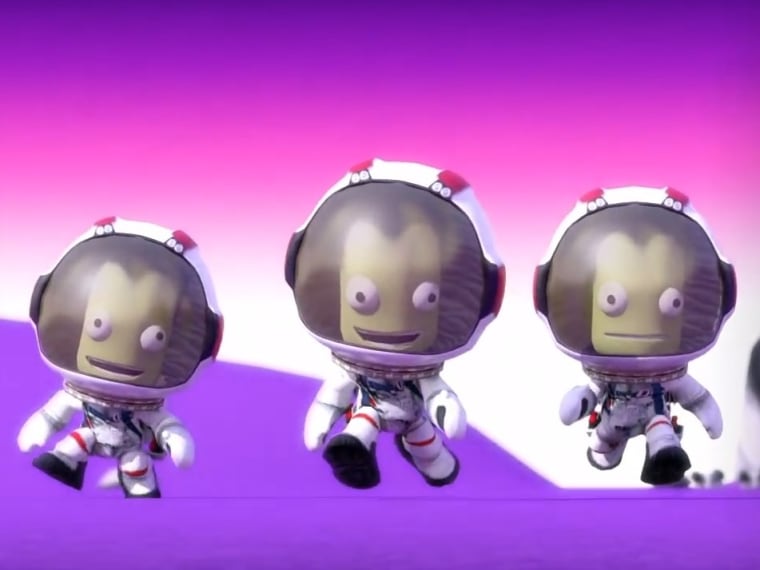The creators of the Kerbal Space Program are over the moon about their spaceflight simulation game's latest honor: being named the Science Geek Gift of the Year.
"It's been a lot of fun," lead developer Felipe Falanghe told NBC News.
The geek gift honors were earned this week as the result of an unscientific vote on NBCNews.com: More than 3,000 votes were recorded, and more than 2,000 of them came from Kerbal fans. Perhaps not coincidentally, this week was also the week of KerbalKon 2013, a third-anniversary gathering of the Kerbal tribe in Mexico City.
A hit with rocket scientists
That tribe is growing every day: On an average day, 43,000 gamers are using the Kerbal Space Program to work on their own virtual spaceflight projects, said Robert Holtzman, who handles KSP's marketing and public relations. Some of those gamers are honest-to-goodness rocket scientists. "Half of JPL is playing that game right now," Doug Ellison, a visualization producer at NASA's Jet Propulsion Laboratory, told The Penny Arcade Report in June.
Kerbal got another boost just this week from Universe Today's Fraser Cain, who called it "the best way to teach anyone the basic (and advanced) methods of aerodynamics and spaceflight."
The game gives players the chance to build their own launch infrastructure and space vehicles, just the way they want them, and bring in crazy-looking astronauts known as Kerbals for blastoff. Sometimes things blow up. That's part of the fun. "So many Kerbals have sacrificed so much under my directorship," Cain said. But those simulated sacrifices don't go for naught: Because the game is based on realistic physics and engineering, players learn how to improve their rockets for the next round.
"They come for the explosions, they stay for the rocket science," Falanghe joked.
Falanghe, 28, said the conceptual seeds of the Kerbal Space Program were planted during his younger days in Brazil, when he and his friends built their own missiles using model rocket engines and fireworks. (Kids, don't try this at home!) "We started making little men out of tinfoil and strapping them onto the rockets," he recalled. The spacemen had nicknames like Jebediah Kerman, Bill Kerman and Bob Kerman — and they came to be known collectively as Kerbals.
Fast forward to 2010, when Falanghe was a developer at Squad, an interactive marketing company in Mexico City. He persuaded his employers to let him and a colleague, Alex Mora, work on a space-themed video game. That's how the Kerbal Space Program was born.
As the months went on, Falanghe kept expecting someone to call him in and tell him that playtime was over. "Thankfully, that call never came," he said.
Kerbal rising
Now there's a global squad of game developers working on the Kerbal Space Program. The phenomenon has attracted tens of thousands of Facebook fans and forum participants. There's a "Kerbalizer" that lets players personalize their Kerbals, a KSP comic strip titled "It's Hardly Rocket Science," and a popular YouTube tutorial series by astronomer-gamer Scott Manley.
The game is always a work in progress, and the price goes up every time the program is updated. "If you buy the game now, it's not going to be as expensive as it will be when the game is complete," Holtzman said. (Today it's $27.)
Kerbal is currently a single-player game, but multiplayer modes are under development. Developers are also adding twists that let players switch from classic sandbox mode to "career mode." For example, players can earn science points by conducting experiments in the game.
More currencies are coming up, Falanghe said. "You're going to have to manage funds. You'll have to stay in a budget," he said. "And you'll also have to manage your space agency's 'reputation' among Kerbalkind. They may be pleased, or they may be displeased with how you're managing your space program."
So watch out, Kerbal fans: Even your Kerbonauts can take only so much punishment.
Facebook fan Kevin Conner suggested the Kerbal Space Program for our Science Geek Gift contest, and in gratitude, we're sending him a geeky goodie bag that includes a 2014 Year in Space Calendar, a slightly used Black Hole Starter Kit, a SpaceX Falcon 9 baseball cap and a signed copy of "The Case for Pluto." Check out these other holiday goodies:
- Gadgets everyone in the home will enjoy
- Laser beam games and other geeky gift ideas
- Tech the halls! Great gadgets for under $100
- Science books for all sorts of tables
Alan Boyle is NBCNews.com's science editor. Connect with the Cosmic Log community by "liking" the NBC News Science Facebook page, following @b0yle on Twitter and adding +Alan Boyle to your Google+ circles.
